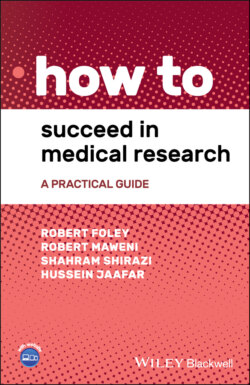Читать книгу How to Succeed in Medical Research - Robert Foley Andrew - Страница 5
Foreword
ОглавлениеP. Ronan O’Connell
It is a great pleasure to write a foreword for a book written by one’s former students, even more so when the theme is How to Succeed in Medical Research: A Practical Guide. The authors kindly acknowledge the support and mentorship they have received. While such guidance is helpful, it is the authors themselves who are to be congratulated for their enthusiasm, altruism, and ambition. They have brought together their collective and varied experiences in a series of monographs that will prove invaluable to any trainee with an impulse to ask a question, enquire more deeply, or challenge perceived wisdom.
The authors have set out the sequential processes of defining a research question, obtaining requisite permissions, collecting and analysing data, presenting results, and synthesising conclusions, all essential steps for those embarking on a research project. The importance of a detailed literature review and critical appraisal before embarking on a project is invaluable advice. Indeed, many would consider the words of an Irish proverb ‘a good start is half the work’ apply as readily to research as to any other endeavour.
Such complexities are not for the fainthearted. Collaboratives such as STARSurg offer medical students opportunities to become involved in an established project. As the authors attest, the opportunity to participate in a research project is often the stimulus to continue and to develop lifelong interest. For the busy clinician, regional, national, and international collaborative and multicentre clinical trails can answer research questions beyond the ability of individual units.
Scientific writing requires discipline and the ability to distil the subject matter to its essence. While social media provide boundless opportunities for collaboration, information exchange, and public engagement, peer review publication remains the benchmark. Remember one good paper in a prestigious journal is worth many lesser publications. Rejection is common and upsetting, but the reader should take heart. All of us have been there, thus the importance of resilience as set out in the last chapter.
For those embarking on a project, do not be afraid to start, and enjoy the satisfaction of answering the questions you have asked.
P. Ronan O’Connell, MD, FRCSI, FRCPS (Glas), FRCS (Edin), FRCS (Eng), FCSHK
President Royal College of Surgeons in Ireland
Emeritus Professor of Surgery, University College Dublin
